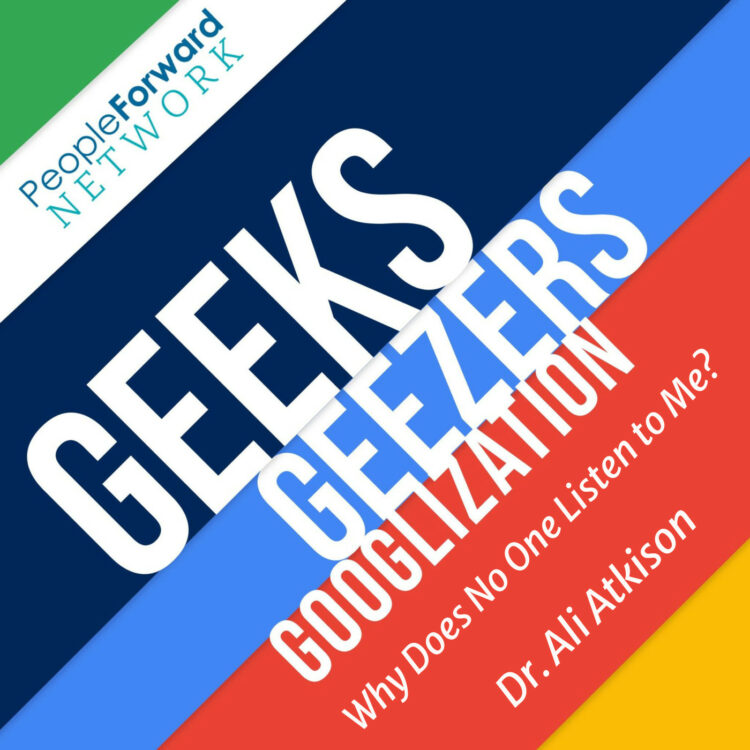Why Does No One Listen to Me with Dr. Ali Atkison

Finding humanity in the digital world.
Why doesn’t anyone listen to me? Business leaders everywhere have probably asked themselves this question hundreds of times over their careers. The last two pandemic years only complicated the art and science of effective communication.
Connecting virtually is easy. Communicating effectively through screen, however, is easier said than done especially for the non-digital native generations. Studies of employee sentiment since the start of the pandemic have exposed a lot: remote and flex work has impacted manager-to-employee relationships. A recent Gallop study about the workplace revealed that 57% of the global workforce does not feel they are engaged or thriving. One reason might be that, on average, an American worker goes six days without speaking to their manager.
The need for interpersonal skills is still a requirement. But “soft skills” in digital communication are becoming exceedingly important even in technical jobs like web developers, UX designers, computer support, and IT roles. According to a recent white paper just released by Burning Glass Institute and Boston Consulting Group, communication skills are either #1 or #2 on the list of skills now required for peak performance in digital occupations. This includes tasks outside of just their typical skill set including talking to clients, collaborating, working in teams, and more.
During this episode hosts Ira Wolfe and Jason Cochran sit down with adult brain learning expert, Dr. Ali Atkison to get her take on the new normal, and how to best establish relationships with employees in remote environments, keep attention during presentations, and present your best self whether remote or in person.
After Listening You’ll Walk Away With:
Tips for connecting and communicating
Knowledge on communication myths
The secret to connecting digitally
How to keep the attention of others in a remote environment
Interested in learning more?
All About Dr. Ali Atkison
Dr Ali Atkison specializes in adult brain learning and communications. She was a communications professor for 20 years and also served as the Associate Dean for University of Denver.
While she was teaching, she really wanted to make sure her students were really learning. She went above and beyond her duty as a teacher and did her own research on how the adult brain works to make sure her students were getting the most out of her classroom.
She shared her findings with others, and that ultimately led her to where she is today – working with trainers and instructors to teach adult brain-based training.
She is President of ROI Communication Solutions which provides speaking, consulting, and training services in professional communication skills backed by the science of how the adult brain learns.
The Danger of Poor Communication Skills
You can bring the best of the best technical skills in literally any industry these days and it still won’t be enough. Dr. Ali points out that long gone are the days when you are just relying on your technical skill set and a college degree to get you ahead. The harsh truth is technical skills just aren’t enough anymore, as the demand for soft skills is disrupting every job role, including technology.
And it’s not just employees who need to communicate better whether it’s remote or in the office. Employees and students just won’t get the most out of their learning if their instructor or manager isn’t equipped with the digital communication skills required.
Want to learn how to improve your communication?
Computer Side Manner
Instead of calling it soft skills, Dr. Ali refers to this as computer-side manner. It stems from thinking about how you show up in all of your mediums. It can be really easy to hide behind a screen and not present your best self. However, Dr. Ali encourages listeners to think about representing their brand to the best of their ability.
Computer side manner is bringing your best self whether it’s on-screen thousands of miles away or seated in a conference room just inches away. It’s time for us to stop separating our remote selves from our in-person selves. At the end of the day, we’re still a whole person. The medium might change, but we are still who we are. Be your best self.
Learn more about presenting your best self by
Tips for Connecting Better and Holding Attention
Dr. Ali shares her favorite tips on how to best connect and hold the attention of a group regardless of if you are in-person or in a remote setting.
Here are some of the insights she offered.
Inquiry –
ask more questions. Curiosity isn’t just a character trait. It is how our brain is learns. Asking questions helps us communicate better. It helps process information for both yourself and whomever you are communicating with.
Virtual meetings –
to set the stage for a successful meeting, allow everyone the opportunity to talk through ideas and collaborate. This way you aren’t just telling the group what to do. Instead you are allowing them to participate, to set the rules and to commit to the solution.
Help bridge the gap –
no matter how intently we communicate, our words and actions might land differently than we intended. If someone makes an incorrect connection to your point, ask them how they came to that understanding and work together to air our your differences. It’s important to remember that teaching and learning are two way streets of collaboration.
Flag what you want your audience to take –
there’s an old piece of advice that still works today: tell them what you’re going to tell. Then tell them, and then tell them what you told them. Give them a heads up that this is important, then repeat it twice to give them the optimal opportunity to process what you just shared.
Move around more –
it sounds simple, but this is a game changer and helps keep the attention of your audience throughout the duration of your presentation or meeting.
Turn off distractions –
When we are committed to being engaged in a conversation, turn off the devices that are competing for our attention. This can include teaching in a classroom, attending a meeting, making a presentation, or receiving a phone call.
Simplifying The Concept of Listening
Sometimes when we think of soft skills, improved communication can often sound like being a better person. Dr. Ali acknowledges that although there is some truth to that, learning to communicate effectively can feel overwhelming.
Instead, start by trying to not answer a question directly, but ask permission to get back to them, followed by asking a question in return. Start by getting back to the other person in an hour, then a day, then a week. Of course, this doesn’t apply to life-and-death emergencies but asking questions instead of giving answers is a critical listening skill. And any new skill takes time and practice until you’re proficient.
Not only does this create a habit, but it helps you connect and have better relationships.
The Science Behind Multitasking
Humans always feel overwhelmed, especially with the amount of information we’re exposed to and take in, largely due to technology. We also have a never-ending to-do list, so many of us resort to multitasking to get everything done. But she has bad news for multitasking – there is no such thing.
But science tells us that human brains aren’t wired to multitask and attempts to do so lead to lower IQs and increases stress, the opposite of our intentions. Our brains simply can’t handle two complex tasks at one time.
Instead, Dr. Ali says we need to think about task switching as a better way to overcome the need to get a bunch of stuff done and still do it well. Devoting all of your attention to one task is the only way to really do your best work.
Ready to learn more?

